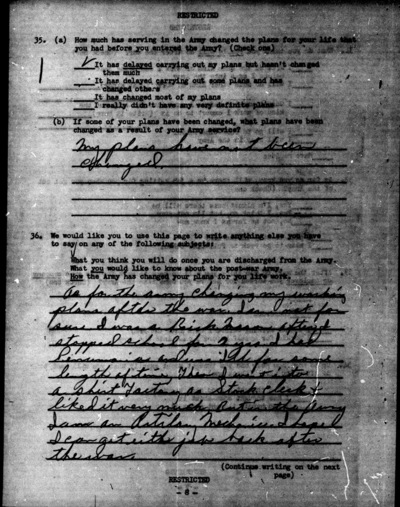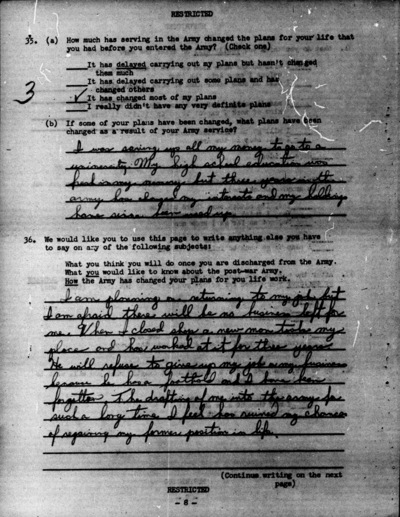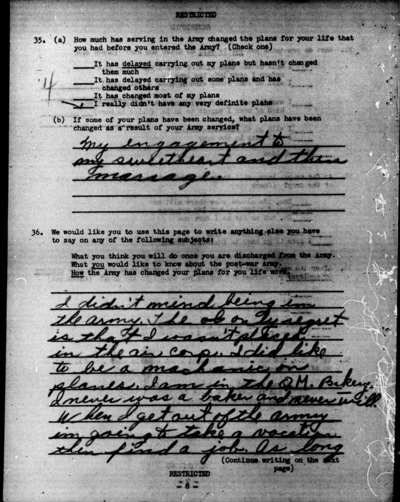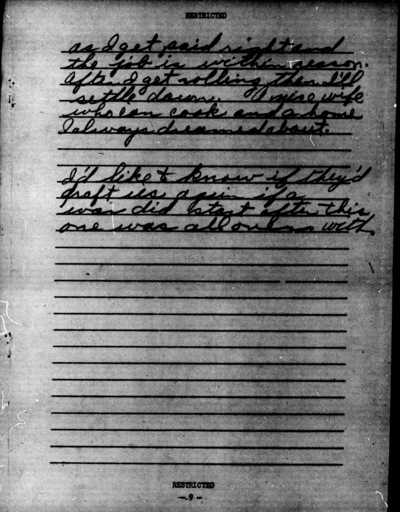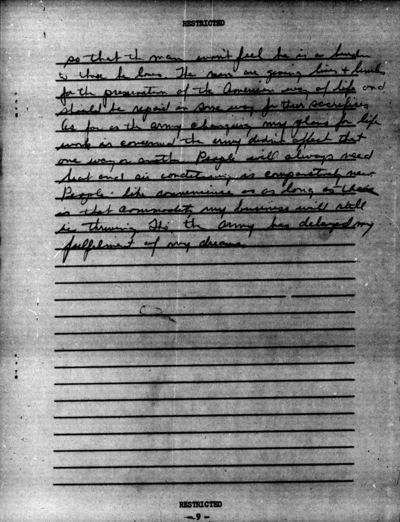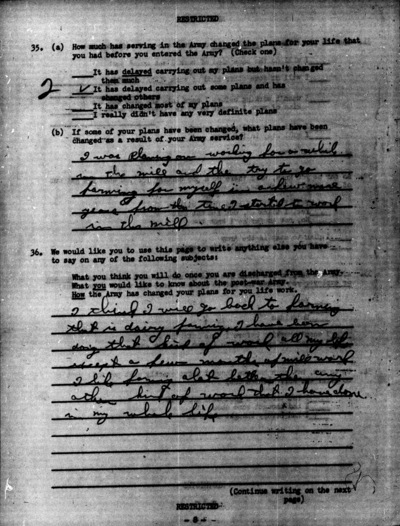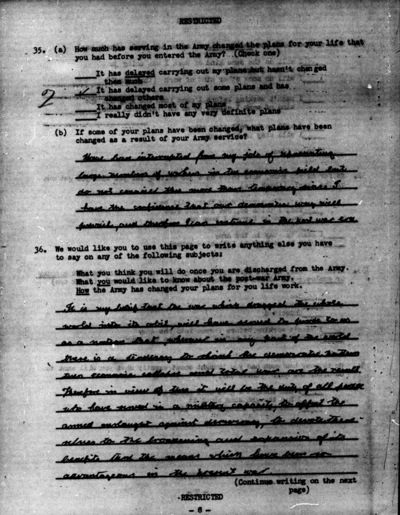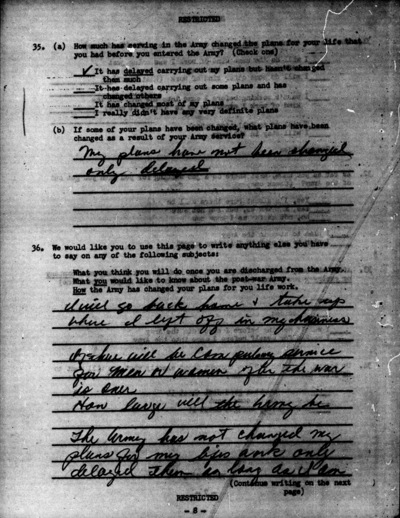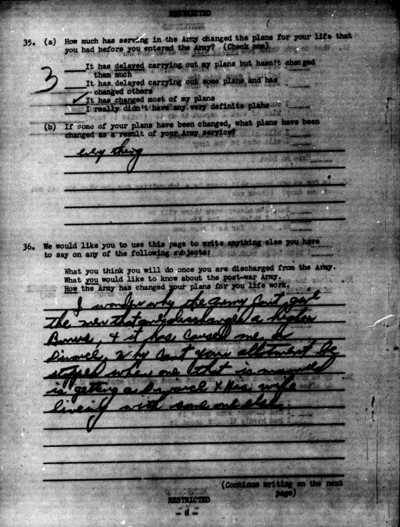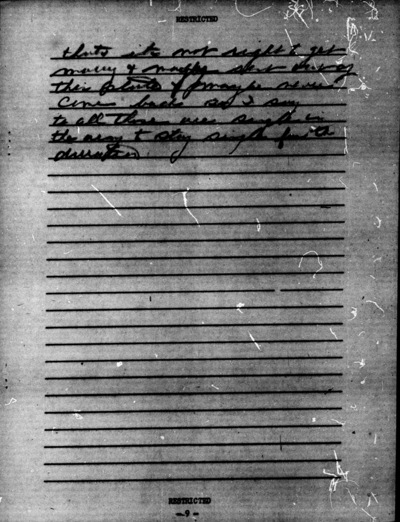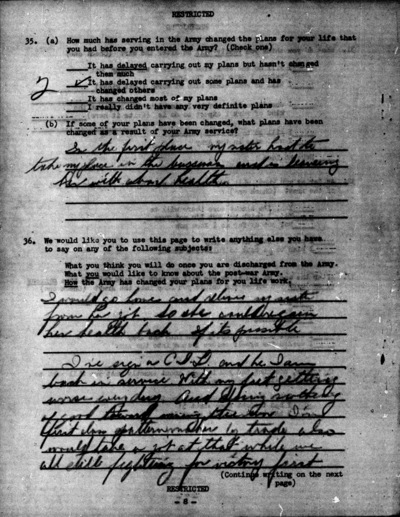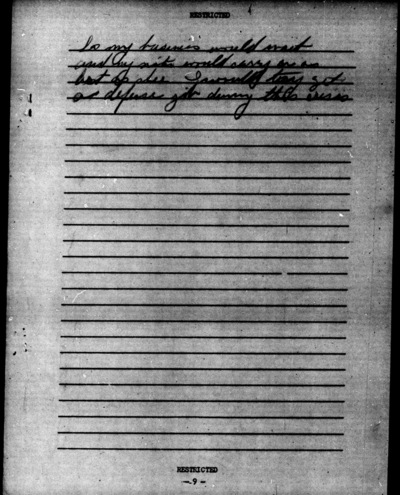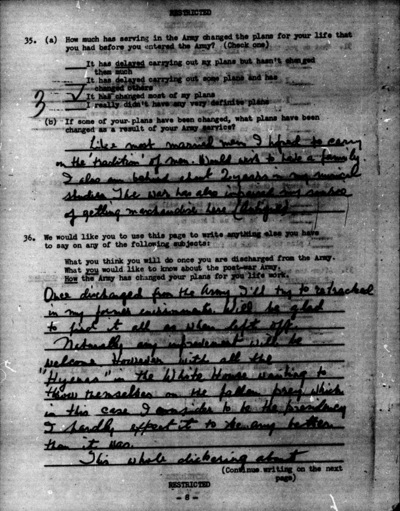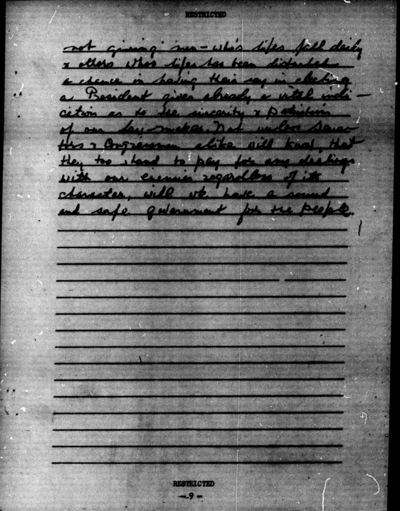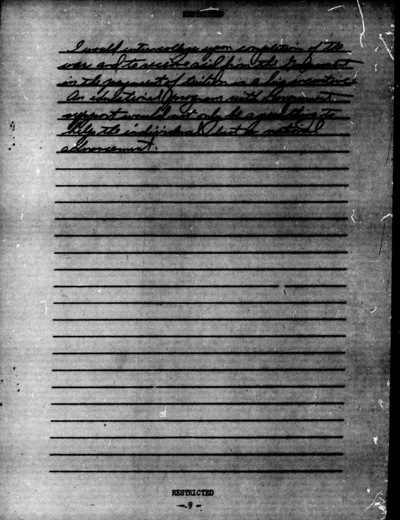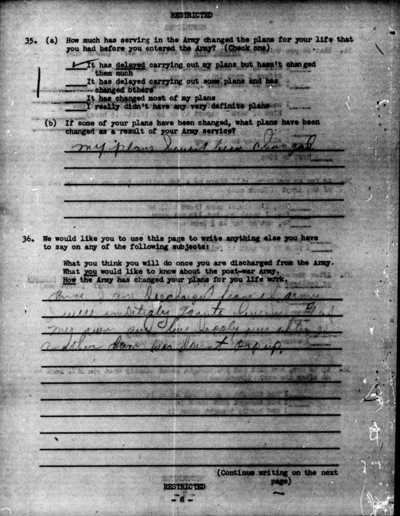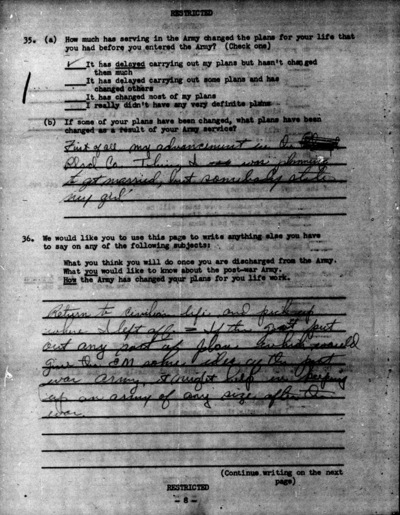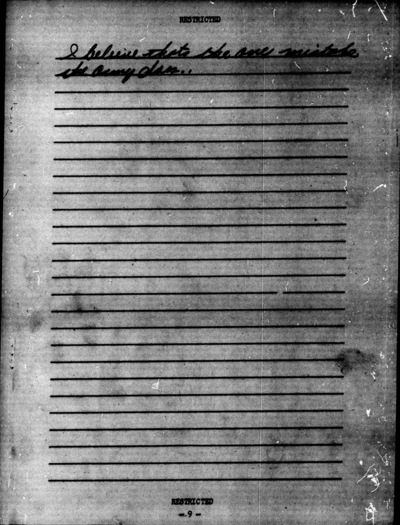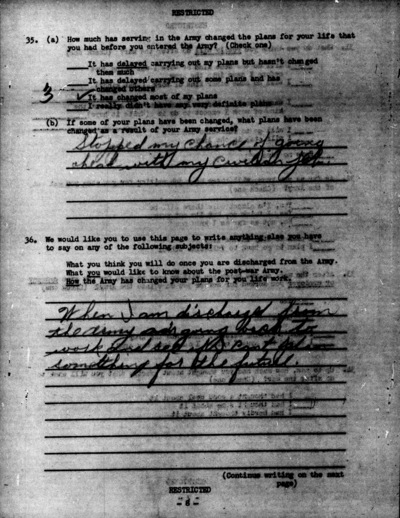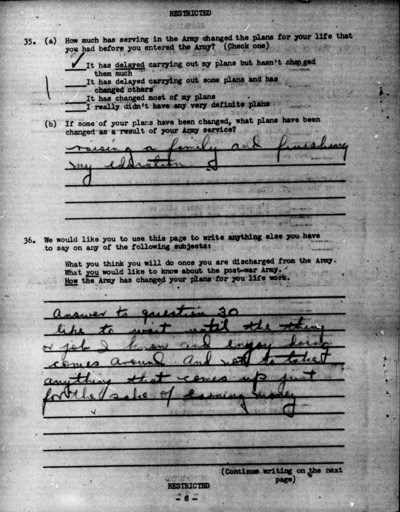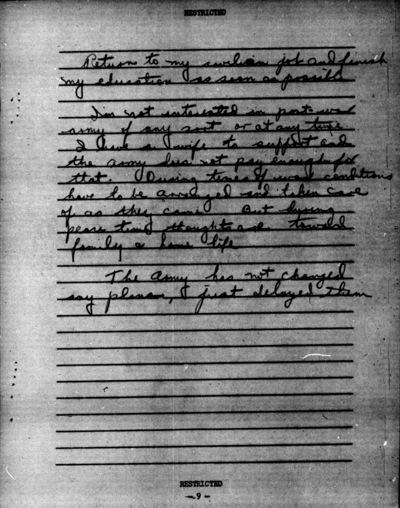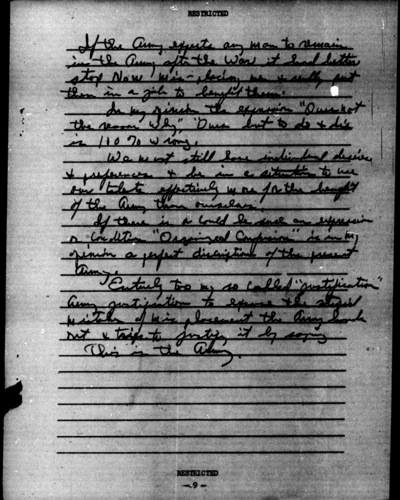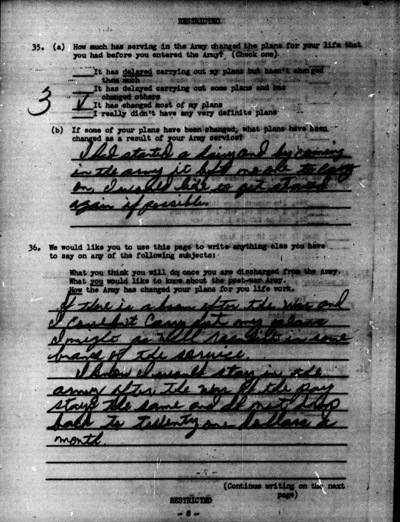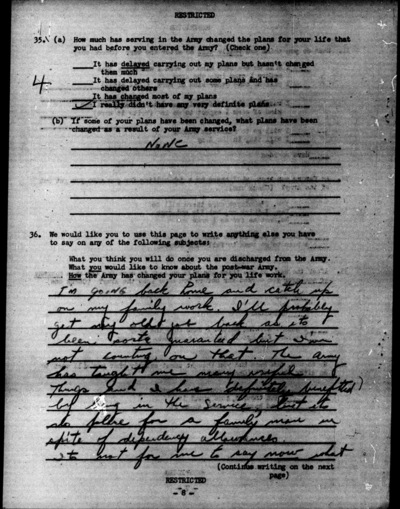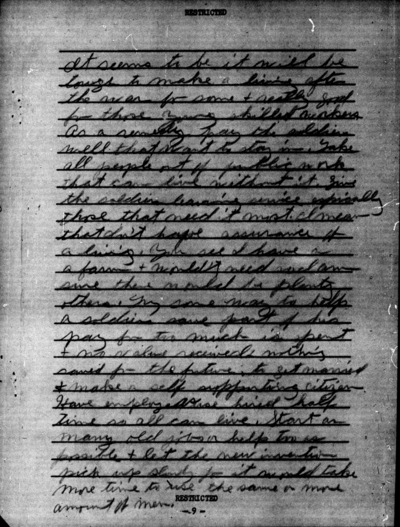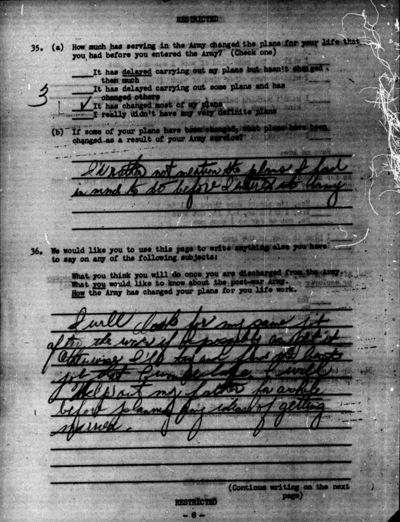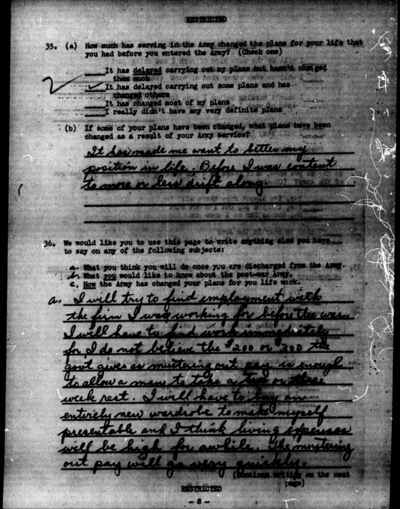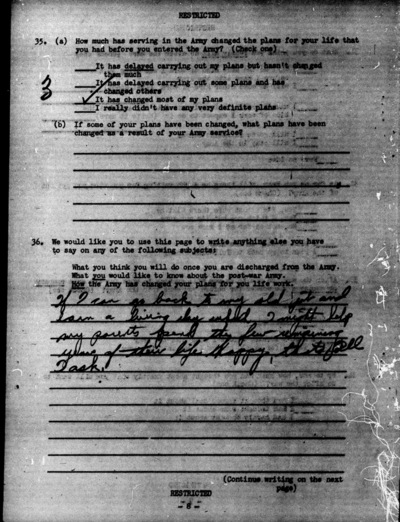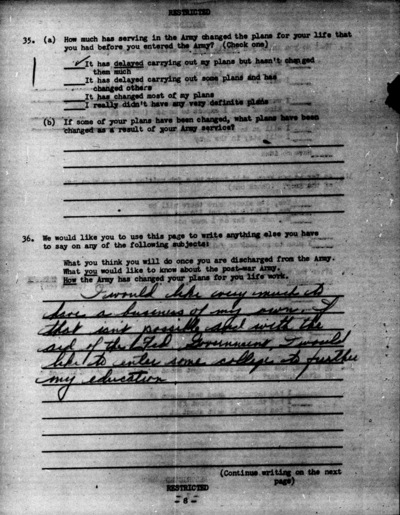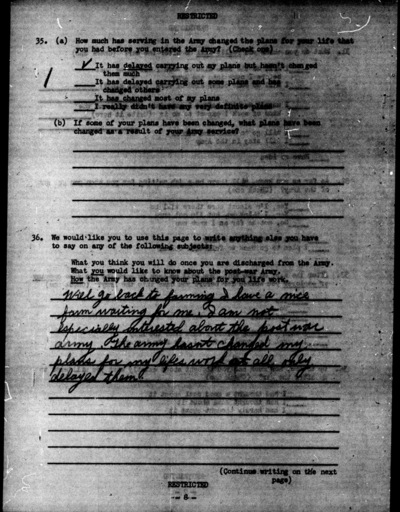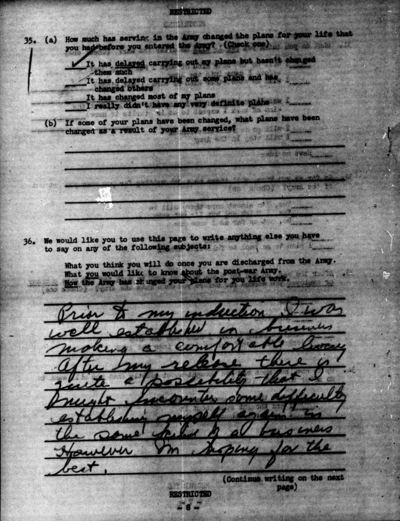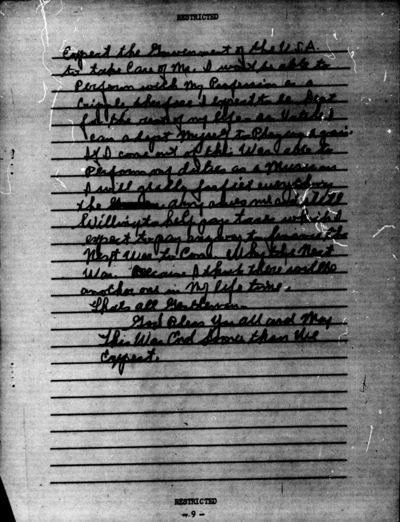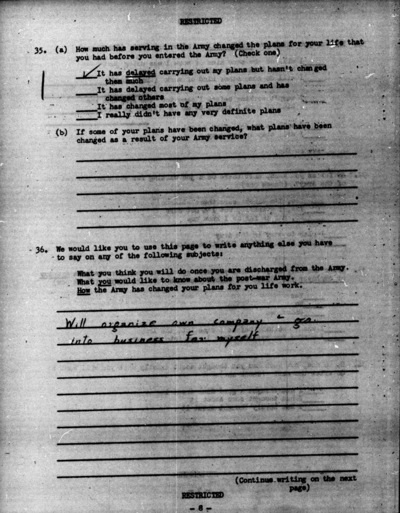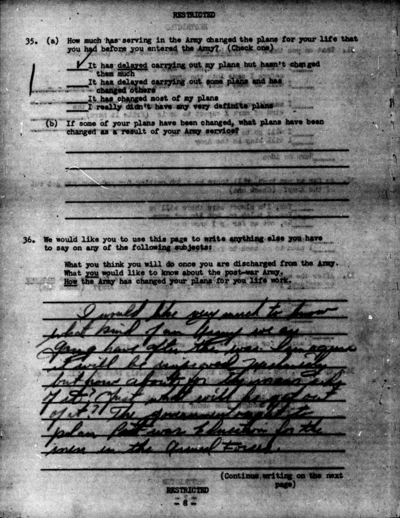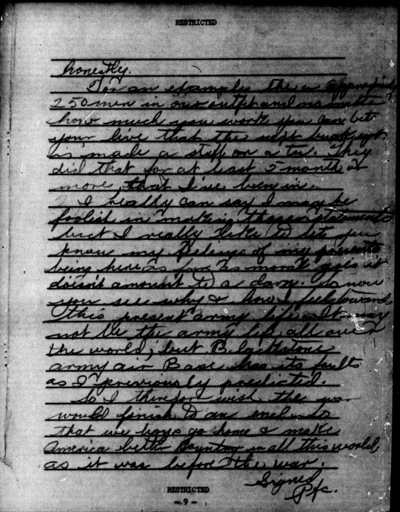S106: Post-War Army Plans (Officers and EM)
To determine what white troops both within Continental limits of the United States and overseas were thinking with regard to their post-war plans. The areas covered included: education, faming, migration, jobs - private and government, and Army career.
a. The original focus of the study was directed toward estimating the proportion of soldiers who were planning definitely to stay in the Army, and of ascertaining the backgrounds and characteristics of such men. Since a soldier's decision to remain in the Army would in many instances be dependent on the materialization of various contingencies, a set of questions was designed to give a scale relative to desire to remain in the Army after the war. This permitted some estimation of the proportions and characteristics of men who might under certain conditions decide to remain, although it was doubtful whether any direct prediction of the proportion who would remain under a certain stated contingency would be warranted.
b. Early in the course of pretesting, it was found that the presentation of various alternatives to staying in the Army reduced considerably the proportion of men who said, in answer to a direct question, that they thought they would stay. Therefore, a set of questions dealing with general job plans, including plans to return to previous employment, plans to attend school, open a business, etc., was developed.
c. At this stage, a request was received from the Department of Agriculture to ask several questions about the specific job plans of men who had worked on farms. A set of questions was developed in discussions with the interested persons in Agriculture.
d. A series of questions relating to expectations of interstate migration was included in the questionnaire, not so much for the purpose of predicting migration after the war (since an unknown economic situation will probably be the prime determinant of such migration), as for the purpose of estimating the prevalence of a desire to migrate. These data afforded some checks on the realism of certain occupational choices, particularly where farming was concerned, and gave some indication of regional trends to be anticipated in the absence of certain economic and social checks.
e. Questions on attitude toward government jobs were included in order to get some notion of the amount of pressure on such jobs which might be expected to materialize.
Analysis of the data obtained from cross-sectional surveys of troops in the United States, Central Pacific Theater and European Theater of Operations gave a fairly good basis of generalization to the Army as a whole, except as combat troops might have a different slant on what is coming to them after they are discharged.
f. The method of analysis attempted to isolate and characterize:
- Those individuals who have specific job plans of one sort or another which they expect to be able to carry out
- Those individuals who have leanings one way or another but were uncertain as to specific job plans
- Those individuals who simply do not have any real plans for the future
g. The questionnaire has six different forms: one for each theater and U.S., and a separate one for enlisted men and officers. These are identified in the following way:
Enlisted forms:
a) S-106 E: United States’ form
b) S-106 ETO: European Theater of Operations’ form
c) S-106 H: Central Pacific Area’s form
Officer forms:
a) S-106 O: United States’ form
b) S-106 O ETO: European Theater of Operations’ form
c) S-106 O H: Central Pacific Area’s form
Questionnaire
Date
Original Size
Location
Alternate Title
Postwar Job Plans of White Officers and EM
Sample Description
A total of 20,064 enlisted man and 4,799 officers from Continental United States, the European Theater of Operations, and the Central Pacific Area are included in this study.
Sample Method
A total of 20,064 enlisted man and 4,799 officers from Continental United States, the European Theater of Operations, and the Central Pacific Area are included in this study.
The United States enlisted sample is a representative cross-section of the Army drawn from 11 AG & ASF installations and 4 Air Fields. Both divisional and non-divisional troops from ground forces are represented in proper proportions; similarly, are station complement troops and other ASF troops in Army Service Forces. In the Air Corps, both men under training commands and not under training commands are included in the sample.
The total United States officer sample was drawn from the same camps (but one) as the enlisted sample. It is not representative of all officers in the U.S. at the time of the study, but a sub-sample of this was so selected as to yield a representative sample of officers in the U.S.
The ETO sample is not a cross-section of all troops in the ETO. It includes only Medium and light Bomber groups and Fighter groups from the 9th Air Force as its Air Corps sample, and it contains only small samples of white and Negro S.O.S. troops for its non-Air Corps sample.
The CPA sample contains men from all branches of service but whether or not these are representative of troops in CPA is not known. Except for one heavy bombardment group, all men in the sample were taken from the island of Oahu.
a. The study contains the following 12 samples:
Officer samples
World-wide cross-section: 2,104 cases; can be identified by “X” punched in Col. 80. United States cross-section: 1,175 cases; can be identified by "X" punched in Col. 80 for cross-section and multiple punch 1,0,6 in Col. 79 for U.S. sample. United States total sample: 2,350 cases; can be identified by 1,0,6 punched in Col. 79 for U.S. sample. ETO cross-section sample: 269 cases; can be identified by "X" punched in Col. 80 for cross-section and "Y" punched in Col. 79 for ETO sample. ETO total sample: 1,396 cases; can be identified by “Y” punched in Col. 79 for ETO sample. CPA cross-section sample: 660 cases; can be identified by "X" punched in Col. 80 for cross-section and "X" punched in Col. 79 for CPA sample. CPA total sample: 1,053 cases; can be identified by “X” punched in Col. 79 for CPA sample.
Enlisted Men’s samples
United States cross-section sample: 10,599 cases; this is the total sample from U.S., can be identified by 1,0,6 multiple punched in Col. 79. ETO sample of AAF Enlisted men: 2,627 cases; can be identified by "Y" punched in Col. 79 for ETO sample and “X” punched in either Cols. 1 or 5 for Air Corps. ETO sample of S.O.S Negro Enlisted men: 508 cases; can be identified by "X" punched in Col. 79 for ETO sample and an even number in Col. 1 for Negro. (There will be no “X” punched in either Col. 1 or 5). ETO sample of S.O.S. White Enlisted men: 1,644 cases; can be identified by "X" punched in Col. 79 for ETO sample and an odd number punched in Col. 1 for white. (There will be no “X” punched in either Col. 1 or 5). CPA sample of enlisted men: 4,686 cases; can be identified by “X” punched in Col. 79 for CPA sample.
[NOTE: The theater location of two questionnaires, Sp106O and Sp106E, are unknown and have been labeled pre-tests, as the free-response question that appears on the scanned archived microfilm, Q.37, does not match any of the six final field forms. The rank of the sample, "O" for Officers and "E" for EM, can be deduced from the content of the free responses. Additionally, S-106O appears on a microfilmed cover sheet that accompanied the series labelled here Sp106-O.]
Scales and Scores
a. Desire for Government Job - U.S. enlisted sample only - punched in second half of Col. 72
b. Desire for Post-war Schooling - both enlisted and officer samples in U.S., ETO & CPA - punched in Col. 73
- Desire to Return to Old Job - U.S., CPA & ETO enlisted sample - punched in Col. 74
- Desire to Own Business - U.S. & CPA enlisted sample - punched in Col. 75
- Desire to stay in Post-war Army - both enlisted and officer samples in U.S., CPA & ETO - punched in Col. 76
- Job Satisfaction - U.S. enlisted sample only - punched in Col. 77
- Old and New Army - Officer samples in U.S., CPA & ETO - punched in Col. 73 (wide cross section only).
- Theater identification punched in Col. 79 (X=CPA; Y-ETO; 106=U.S.)
- Air Corps gang punched "X” in Col. 80 in U.S. enlisted sample. In all remaining samples an "X" punched in Col. 80 stands for cross-section.
Location Details
Chanute Field, IL
Ft. Devens, MA
Hunter Field, GA
Ft. Monmouth, NJ
Brooke General Hospital, TX
Camp Cooke, CA
Camp Crowder, MO
Camp Ellis, IL
Camp Haan, CA
Camp Polk, LA
Camp Shelby, MS
Camp Silbert, AL
Camp Swift, TX
Camp Van Dorn, MS
Cooke, CA
Ft. Sam Houston, TX
Indiantown Gap Military Reservation, PA
Keesler Field, MS
Lincoln Army Air Base, NE
MacDill Field, FL
Pomona Ordnance Depot, CA
San Francisco POE (John T. Knight, Oakland), CA
Santa Ana Army Air Base, CA
Shelby, MS
Stoneman Port of Embarkation, CA
Field Personnel
Donald Griffin
Charles N. Elliott
George E. Cole
John Clausen
Eric E. Sundquist
Daniel F. Connell
Robert S. Wattles
Charles Kornheiser
Robert Ford
Study Analysts
Origin
Hqs, ETO
Reports
B-120 Plans of White Enlisted Men for Business or Farms of Their Own After Leaving the Army
B-121 Post-war Educational Flans of White Enlisted Men
B-127a Plans of Air Force Personnel for Post-war Service
B-128 Post-war Migration Plans of Soldiers
B-129 Post-war Occupational Plans of Soldiers
B-130 Soldiers’ Plans to Own Businesses After They Leave the Army
B-130a The Problems of Predicting the Number of Veterans Who Will Have Businesses of Their Own After They Leave the Army
B-131 Soldiers’ Plans for Farming After They Leave the Army
B-132 Soldiers’ Plans for Government Jobs After They Leave the Army
B-133 Post-War Educational Plans of Soldiers
B-135 Reenlistment Plans of White Enlisted Men in the Army Air Forces
B-136 Plans of Company Grade Officers in the AAF to Remain in the Army
WST (Special Issue) Post-war Plans of the Soldier
WST #13 Soldiers' Post-war Employment Plans
Monthly Progress Report, Section 10, September 1944 Soldiers' Plans for Starting Own Enterprises
Monthly Progress Report, Section 10, Oct. 1944 Interest in Post-war Farming
Monthly Progress Report, Section 10, March 1944 How Many Men Plan to Return to School
Notes
Earlier pretest forms Sp-106A and Sp-106 A-1 were used a third pretest Sp-106C followed the B series outlined above. The data on these were not preserved (few cases) and this outline refers only to the B-series mentioned above.
Study Analysts [details]: Leta Adler (Government Jobs); John Clausen (Post-war jobs, farming, own business, etc.); George Hausknecht (U.S. sampling); Abram Jaffe (Post-war migration); Shirley Star (Post-war education); Edward Suchman (Post-war Army); Seymour Wolfbein (Post-war migration)
